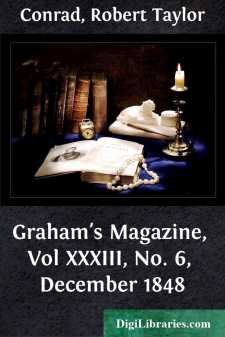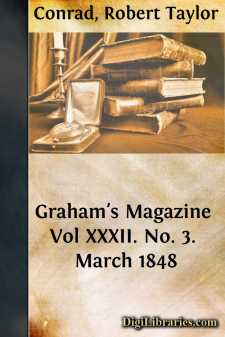Categories
- Antiques & Collectibles 13
- Architecture 36
- Art 48
- Bibles 22
- Biography & Autobiography 813
- Body, Mind & Spirit 142
- Business & Economics 28
- Children's Books 17
- Children's Fiction 14
- Computers 4
- Cooking 94
- Crafts & Hobbies 4
- Drama 346
- Education 46
- Family & Relationships 57
- Fiction 11829
- Games 19
- Gardening 17
- Health & Fitness 34
- History 1377
- House & Home 1
- Humor 147
- Juvenile Fiction 1873
- Juvenile Nonfiction 202
- Language Arts & Disciplines 88
- Law 16
- Literary Collections 686
- Literary Criticism 179
- Mathematics 13
- Medical 41
- Music 40
- Nature 179
- Non-Classifiable 1768
- Performing Arts 7
- Periodicals 1453
- Philosophy 64
- Photography 2
- Poetry 896
- Political Science 203
- Psychology 42
- Reference 154
- Religion 513
- Science 126
- Self-Help 84
- Social Science 81
- Sports & Recreation 34
- Study Aids 3
- Technology & Engineering 59
- Transportation 23
- Travel 463
- True Crime 29
Graham's Magazine, Vol XXXIII, No. 6, December 1848
Description:
Excerpt
CHAPTER I.
Archibald Dundass was a rich Jamaica planter, whose estates were situated in one of the most delightful regions in that garden of the West India isles. His wife, an English lady, of great personal attractions and highly connected, died when Helen, their only child, had just entered her thirteenth year, an age when, perhaps, a mother's counsel and tender guidance is most required. When the news of Mrs. Dundass's death reached her friends, they immediately wrote, beseeching the bereaved husband to come at once to England with his child, or if not expedient for himself to leave Jamaica, that he would at least suffer the little Helen to come to them; and especially did they urge the plea that thereby he would enable her to receive a more finished education than could possibly be acquired upon the island.
This plea, to be sure, offered a strong inducement to Mr. Dundass; but how could he school his heart to this second bereavement. Helen possessed all her mother's traits—her dark blue eyes—her golden hair and skin of dazzling purity—the smile that played around her dimpled mouth—her light airy step, were all her mother's. Looking upon her thus in her budding loveliness the Helen of his youth once more moved before him. To yield her up he could not—and therefore Mr. Dundass rejected the oft-repeated entreaties of his English friends. Helen remained in Jamaica. A governess was provided, and whatever money could secure in the way of learning was most freely expended.
Mr. Dundass possessed many noble traits of character, yet pride was a very strong ingredient in his composition leading him not unfrequently into errors which his sober judgment condemned. Still he was generally beloved, especially by his slaves, to whom he was a kind, indulgent master. Knowing himself to be one of the richest, if not the richest proprietor upon the island, it was natural he should mark out an alliance for his daughter commensurate with the fortune her hand would bestow. When, therefore, Helen, beaming and beautiful as the star of evening, burst from the confinement of the school-room to dazzle all eyes and move all hearts, what wonder that pride and ambition swelled the heart of Mr. Dundass. But
"Love will venture in where it daur nae weel be seen;"and, unfortunately for the realization of those ambitious dreams, a mutual love had already sprung up between Helen and a young man without friends or fortune, whom her father had received into favor, and employed for some years in his counting-room.
To appeal to Mr. Dundass for his sanction to their union Ward knew would be vain, and he therefore prevailed upon the imprudent Helen to elope with him, assuring her that her father's anger would be but momentary, and that his great affection triumphing over resentment, would compel him to forgive her error, and open his arms to welcome her return. But, unhappily, it was not so. There was no moving the heart of Mr. Dundass to forgiveness. His anger and resentment were as boundless as had been his love....












